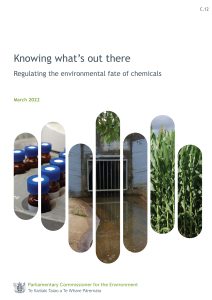Regulation of chemicals
NZIAHS is not alone in pressing for more money for science and science-related work. Another major review with implications for the agricultural and horticultural sector was conducted by Simon Upton, the Parliamentary Commissioner for the Environment, who is proposing changes to the way New Zealand manages chemicals to ensure their environmental impacts are not overlooked.
 His report, ‘Regulating the Environmental Fate of Chemicals’ HERE, examines how well our regulatory system takes account of the environmental fate of chemicals, including agrichemicals such as neonicotinoids, terbuthylazine, Zinc bacitracin (antibiotics mainly used for poultry) and tetracycline antibiotics used in vetinerary medicine applications.
His report, ‘Regulating the Environmental Fate of Chemicals’ HERE, examines how well our regulatory system takes account of the environmental fate of chemicals, including agrichemicals such as neonicotinoids, terbuthylazine, Zinc bacitracin (antibiotics mainly used for poultry) and tetracycline antibiotics used in vetinerary medicine applications.
The report found gaps in the way chemicals in the environment are regulated and in how their impact on living things is interpreted. It says many chemicals that have been in use for decades have not been subject to close scrutiny, although much of the science on their environmental impact has changed.
Mr Upton says the rules about how a chemical can be used shouldn’t be static – regulatory authorities need to be able to adapt as new information comes to light: “Restrictions should be based on the latest science and informed by New Zealand-specific data on use and impact.”
More than 30,000 chemicals have been approved for use across the country, the report says, but only around 200 chemicals are routinely tested for. The monitoring that is undertaken generates little feedback to the chemical management system that determines how chemicals are used.
A key recommendation is that the Environmental Protection Authority (EPA) expand its powers to require much more data from chemical importers, manufacturers and sellers.
But – here it comes – that’s where money becomes an issue.
Among the immediate reactions, the EPA said it is working hard to fill big gaps in the regulation of chemicals but needs more funding. Its chief executive, Dr Allan Freeth, said it would bring in new rules later this year to switch from collecting data voluntarily on just a few chemicals, to demanding more data on many more substances.
Dr Freeth acknowledged the whole system was fragmented across four regulators (EPA, Ministry for Primary Industries, Medsafe and WorkSafe) and had a long way to go to be good enough, but they lacked funding to get there. “We need funding for reassessing our priority chemical list – we’ve got some extra funding for that, but it’s nowhere near enough.”
University projects
NZIAHS welcomes news of these recently announced initiatives.
First, work is close to completion on Massey University’s Dairy 4 Farm, after the university partnered with AgResearch to boost on-farm research capability and facilities in the lower North Island.
The facility will enable greater interaction between staff and students of Massey and AgResearch and provide scope for a range of independent trials to operate at any one time. Hydraulically isolated paddocks will allow comparisons of the impact of grazing practices on nutrient run-off at paddock scale.
The Dairy 4 Farm, adjacent to Massey’s Manawatū campus, has approximately 600 spring calving cows and is the largest of the university’s two farms.
Second, the board of Potatoes NZ Inc. (PNZ) has signed a memorandum of understanding with Lincoln University to launch a research partnership which includes a Centre of Excellence for Potato Research and Extension, based in Canterbury.
Lincoln University Associate Professor of Plant Science, Clive Kaiser, will be the establishment Director for the Centre of Excellence for Potato Research and Extension, and he says the new Centre will be extension-led and grower-centric.
NZIAHS welcomes too, news of a new Lincoln doctoral scholarship which aims to help meet the need for alternative pastoral livestock production systems that will foster the environment, soil, livestock, and human health.
The Sir Graeme Harrison Pastoral Livestock Production PhD Scholarship is supported by a former Lincoln University council member and founder of ANZCO Foods, an organisation that produces beef and lamb products. It covers tuition fees and includes a $28,000 stipend per annum. The closing date for applications is 1 April 2022. The scholarship is offered through the Lincoln University Pastoral Livestock Production Lab.
MPI projects
Funding for specific projects is flowing from the Ministry for Primary Industries, too:
- The Government is injecting $700,000 into the Māori Agribusiness Sheep Milk Collective to help it explore the potential to sustainably produce sheep milk at scale, create jobs and further grow this emerging export market. The collective aims to have several farms milking about 25,000 sheep and potentially employing more than 100 people by 2030.
- The Government is partnering with Ngāti Hauā Iwi Trust to develop a horticultural programme that will empower Ngāti Hauā whānau to upskill, diversify their businesses and sustainably generate wealth from their land. The Waikato-based iwi has received $1.12 million from the Ministry for Primary Industries’ Sustainable Food and Fibre Futures (SFF Futures) fund and $150,000 from the Ministry for Social Development.
- The Ministry for Primary Industries is investing $1.34 million in hemp research and development through its SFF Futures. The funding recipient, New Zealand Natural Fibres, is putting $2 million into the five-year programme, which will explore flooring, food packaging and active-wear among other innovations.
- The Government is investing $440,000 to help members of the Wairoa Horticultural Hub build on the potential of their land and to create jobs. The project aims to lift the productivity of Māori-owned land in northern Hawke’s Bay.
Climate change
 Climate change and its implications for farming and agriculture is the most critical issue being addressed today, not only for NZIAHS members but for everybody on the planet. This was reaffirmed by scientists in the latest Intergovernmental Panel on Climate Change (IPCC) report.
Climate change and its implications for farming and agriculture is the most critical issue being addressed today, not only for NZIAHS members but for everybody on the planet. This was reaffirmed by scientists in the latest Intergovernmental Panel on Climate Change (IPCC) report.
The grim conclusion is that the world faces unavoidable multiple climate hazards over the next two decades with global warming of 1.5°C. Even temporarily exceeding this warming level will result in additional severe impacts, some of which will be irreversible.
Increased heatwaves, droughts and floods are already exceeding plants’ and animals’ tolerance thresholds, driving mass mortalities in species such as trees and corals, and exposing millions of people to acute food and water insecurity.
This country’s efforts to tackle climate change include recent changes in the government’s thinking about carbon farming and the Emissions Trading Scheme. These changes are reflected in a discussion paper on forestry management issues which fundamentally brings questions about land use into focus.
From 2023, under current rules, a new permanent forest category of the ETS would allow both exotic and indigenous forests to be registered in the scheme and earn New Zealand Units (NZU). The government is now proposing to exclude exotic species – such as pinus radiata – from the permanent forest category.
The proposals address mounting concerns among some industry groups and community organisations about the risk of permanent exotic forests displacing pastoral farming, and production and indigenous forests.
The discussion document is Managing exotic afforestation incentives: Proposals to change forestry settings in the NZ Emissions Trading Scheme.
Notices to Members
NZIAHS Awards – Nominations and Applications are open – closing date 1st May 2022. We have a range of awards for members: recognising achievement in agricultural and horticultural research, providing assistance towards the cost of undertaking research, awards for communication in agriculture and horticulture and for services to the Institute at the local section level. To view our awards
https://agscience.org.nz/membership/awards/
Congratulations to Members
2022 New Year’s Honours List
 |
Dr Mike Dunbier, CNZM For services to agricultural science. |
 |
Dr Peter Fennessey, ONZM For services to agricultural science and business |
 |
Dr Jill Stanley For her contribution to plant physiology and crop science over four decades. https://www.plantandfood.com/en-nz/article/science-new-zealand-awards-recognise-plant-and-food-research-scientists |
IHC2022 Angers, France 14-20 August 2022
3MHT Thesis Competition is an international competition for those who have recently completed their PhD to present their thesis in 3 minutes at the IHC2022 plenaries. Deadline for applications 15th April 2022.
The Education Committee of IHC2022 is pleased to launch an international competition for PhD theses in Horticulture, in the form of “My thesis in 3 minutes” competition. This new competition, named 3MHT, is conceived as a specific event, designed for this congress. The 3MHT is designed to showcase the work of young scientists who have recently defended an outstanding PhD in the field of horticulture, with a vote by the congress audience.
All of the relevant information can be found at: https://www.ihc2022.org/thesis-competition/
Jobs at Massey University, Palmerston North
 The School of Agriculture and Environment, Massey University, are seeking an applicants to apply for the following positions within the Whenua Haumanu programme.
The School of Agriculture and Environment, Massey University, are seeking an applicants to apply for the following positions within the Whenua Haumanu programme.
1 x Research Officer (full time) – Further Information HERE
2 x Research Technicians (full time) – Further Information HERE
1 x Research Technician (fixed term) – Further Information HERE
2022 NZIAHS Membership Invoice
Please note that your invoice for 2022 NZIAHS membership has been emailed to you. or you can renew online HERE
If you haven’t received it, please look in your junk folder or email Jenny Taylor on secretariat@agscience.org.nz











